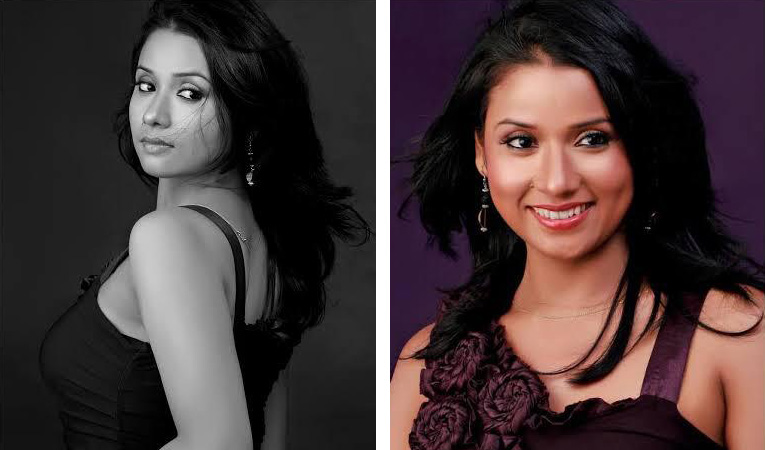India’s Urmila: The Assamese actor that Tamil Nadu loves

In many ways, Urmila Mahanta epitomises India. She’s the essence of what makes us all part of this noisy, gigantic multicultural subcontinent.
Consider this: born in the small town of Sonapur in Assam, with a population of less than 10,000, Urmila leaves home after college to travel 3000 kms to Pune to study at the Film and Technical Institute of India (FTII), works in Mumbai and then lands a star role in a Tamil-language film. Within a short span, she’s traversed the country, learnt and acted in multiple languages, found a home away from home: she’s struggled, she’s thrived and most of all she’s found joy in experiencing and absorbing cultures as rich and varied as there are people and ethnicities in this country.
Born to Giridhar and Ramala Mahanta and a sister to three siblings, Urmila had her school and college education almost entirely in Assamese. Growing up in Sonapur, which was a village then, she was surrounded by nature’s bounty. The air was heavy with the fragrance of flowers and bird song. It was impossible not to love the arts. Acting was quite simply an inner calling.
As a child, Urmila attended theatre workshops and acted in local plays. By the time she finished college, she had got herself assignments on Doordarshan’s NE TV - at that time the only television station in the Northeast - and had already acted in a film made by a student at the FTII. Acting as a profession seemed a real possibility – her window, nay her ticket, to the rest of the country. Goaded by her sister, she applied to the FTII for a course and to her surprise, got in. Her world was finally opening up. Soon Urmila, the actor, would be noticed. Aaliya, a short film that she appeared in, won the Special Critics Award at the 2012 Mumbai International Film Festival. But it was in Tamil director Balaji Sakthivel’s thriller Vazhakku Enn 18/9, where Urmila essayed the role of a slum dweller, that she truly came into her own. She became the first actor from the Northeast to be nominated for an award for a role in a Tamil film. Critics wrote of her understated performance, of her impressive, poetic presence, her effortless acting. That a girl from Sonapur in Assam would win the hearts of a Tamil audience was nothing short of a miracle.
And even though she went on to act in Hindi films including Pareshaanpur, which is yet to be released, Manjhi the Mountain man, with Nawazuddin Siddiqui, Akira and Padman, it is Vazhakku she considers her “base”, because it is the gruelling hours, her complete immersion in the character and Director Sakthivel’s guidance that made her realize that if she slogged and stayed the course, anything was possible, even if it meant acting in a language foreign to her orlater, accepting a role to be the mother of a fruit. It was no surprise then that she soon got an offer to act in a Malayalam film.
There’s a single-mindedness about Urmila that comes across when she speaks with NEStories; a strength of character that is borne of struggle. Nothing comes easy in the film industry, she says. It is severely cut-throat. But there’s a magic in working towards a goal, a thrill in jumping over hurdles to reach that destination. She describes to us in meticulous detail, what it takes to get into character, her deep dislike of laziness, how directors like Ketan Mehtaand Majid Majidi inspire her and what it’s like to work in Mumbai, where she’s, rather bravely, shifted base.
Urmila Mahanta’s is a truly fascinating story. It is a story of deep determination and of possibilities. It is also a story of that invisible thread that connects one end of India with the other.

Where did you grow up? And what was it like?
I was born in Sonapur, it’s a small town now, it was a village when we were growing up – very beautiful. It was a simple life. I studied in an Assamese medium school, but there was art always around. In Assam, I would say there is art, colour and beauty in the air.
How did you get into acting?
Well, it sounds a bit philosophical, but I would say it was an inner calling of sorts. After college, I did some acting in Guwahati and other parts of Assam. I did some satellite shows for NE TV, which was the main channel of the Northeast back then. When I was doing my masters in Assam, got a call from a student in FTII in Pune and I did that film. When I came back to Assam, I wanted to stay here, keep working in Assam. But on the advice of my sister, I applied to FTII in Pune and actually got in. I remember that I didn’t tell my friends or anyone, I was sure I wouldn’t pass the entrance. But that is where it really started, I think. With my entrance into film school, I started getting more exposure.
What do you consider your big break?
FTII, like I said! But it was also when I went to Goa for a festival while I was studying andI met Balaji Sakthivel sir, who gave me my first break in SouthIndian films. I remember that audition so well - we were taken onto location, in costume. It wasn’t like I was in some room and made to read lines. Each move of mine was monitored. And because I couldn’t speak Tamil, I did the audition in English. It was a bet, really, but I was taking whatever came my way. A year later, I realized I was given the role in his film Vazhukku Enn 18/9. I got a lot of good reviews, and my acting was praised by critics. But it was such a surprise, I didn’t even speak Tamil properly. I was the first actor from the North East to win awards in South Indian cinema. Vazhukku is my base; I consider it with great respect.
So what do you do when you cannot speak the language? You do films across languages, right?
I can speak English, Assamese, Hindi and have learnt Bengali. Of course, Tamil was difficult for me, and everyone spoke so quickly! It is a beautiful language. But I speak slowly, as do many in Assam (laughs). When my fellow actors would speak six words, I would have spoken three. I did a lot of homework, learned my lines and practised every scene hard. I also really worked on my character. I would rehearse the expressions I would need to react to the other actor’s dialogues so that at no point did I look lost. It was hard work. But after that, I don’t consider language a barrier.
Your range of films is diverse.
(Laughs) Yes, I suppose it is. My first Hindi film Pareshaanpur has not released yet. I did Manjhi the Mountain man, with Nawaz (Siddiqui), which got good reviews. To be in his presence was daunting, he has taught me so much. I had roles in Akira and Padman. I am working now in Bengali and Assamese films, and have also worked in Malayalam movies.
All your films have good reviews. Are you a critic’s actor?
I am a director’s actor. I don’t know much else. I want to do my best to make the film I am in, come alive. I learn a lot from the director’s I work with, like Ketan Mehta sir or Majid Majidi. With Majidi, when I was working, I thought I was in a dream. His way of setting the scene is so unique.

What is something you look for in your films, then? The director?
Well, yes. But also,the character in question. A character is everything for an actor. I am not a star, you see, I act for the love of it. To be inside a character is like studying. It takes work and it is rewarding. You learn something at every step. I want to make sure I am a studious actor; I don’t like to be lazy. I have to put in the work. Not do I have some surname attached to it. Others would say this is a disadvantage, but I see a certain magic in actually working towards something, acting well and taking up different roles.
But this is challenging…
Of course, it is challenging. But I will choose to build on it. It is the biggest challenge. Especially now, I have moved to Mumbai. And in Bollywood you are competing with a large number of things, each day can be difficult. So I have to keep proving myself. I have to keep polishing myself and doing everything it takes. I look forward to character-focused roles. Like in Kothanodi (Bhaskar Hazarika’s award-winning Assamese film), one of my most treasured roles is where I was the mother of an Otenga (a fruit) - that was so unconventional, I would do a role like that again.
You were in Kothanodi? Audience could not even even recognize you in that.
Yes, I was.That is such a compliment. Thank you. Many people tell me that: we didn’t recognize you in Kothanodi or other films. But that is the point. On-screen, I am not Urmila Mahanta. If I am, what is the point?
You have such a positive attitude to this. What are other challenges — Do you see a problem with the beauty standards in the film industry, for example?
Yes, definitely. Especially in Bollywood. Light skin is favoured, a certain body type is set as the standard. But things are changing, that’s for sure. We aren’t in the 1990s anymore, thank god!
Any advice for other aspiring actors from the Northeast?
I would say work on your craft. Don’t put yourself down if you are not from a rich background, keep going, learn from everyone, other actors or a local guru. If you want to be in Bollywood, be prepared for the world it is - lots of rejections. Some things are out of our control, but we can find other paths. Those other paths are equally important. It is not only Bollywood. We need to give equal worth to local and regional industries as well.

Story Partner: Media9

